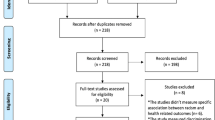Abstract
This study aimed to examine the perceived psychological costs and benefits of Sabbath (Shabbos) observance among 13 practising Jews, 9 UK residents and 4 US residents. Emerging themes were as follows: Shabbos as a special day, giving time to contemplate on profound issues, withdrawal and rest from mundane concerns, and deepening relationships. These aspects can potentially improve feelings of mental well-being, and were indeed often said to do so. Some difficulties were described: some found they were prone to worry more on Shabbos because of the freedom from distractions, and there were reports of the difficulties of explaining to non-Jewish work colleagues the religious need to be free from work commitments. These findings were related to the literature on religious ritual observance and generally accord with other work in anthropology and psychology of religion examining the psychological impact of ritual. Work on the mental health implications of ritual observance needs to be expanded. It has received only limited attention, and understanding has been constrained by a misleading confusion between ritual and obsessionality. Other impacts of religion on mental health are better documented and understood, and religious ritual and its impact needs further documentation and attention.
Similar content being viewed by others
References
Benson, H., & Stark, M. (1996). Timeless healing. New York: Fireside.
Braun, V., & Clarke, V. (2006). Using thematic analysis in psychology. Qualitative Research in Psychology, 3, 77–101.
Dein, S. (2011). Ritual: The forgotten dimension in mental health. Psyche and Geloof, 22(2), 91–101.
Eliade, M (1957) The sacred and the profane: The Nature of Religion (trans: from French: W. R. Trask). Harvest/HBJ Publishers.
Elliott, R., Fischer, C. T., & Rennie, D. L. (1999). Evolving guidelines for publication of qualitative research studies in psychology and related fields. British Journal of Clinical Psychology, 38, 215–229.
Erikson, E. H. (1950). Childhood and society. New York: Norton.
Freud, S. (1907) Obsessive acts and religious practices. Collected papers, 1907/1924. London: Hogarth Press.
Goldberg, A. (1986). The Sabbath as dialectic: Implications for mental health. Journal of Religion and Health, 25, 237–244.
Hill, P. C., & Pargament, K. I. (2003). Advances in the conceptualization and measurement of religion and spirituality: Implications for physical and mental health research. American Psychologist, 58, 64–74.
Hinde, R. A. (1999). Why gods persist: A scientific approach to religion. London: Routledge.
Jacobs, J. (1992). Religious ritual and mental health. In J. F. Schumaker (Ed.), Religion and mental health. New York: Oxford University Press.
Koenig, H., King, D., & Carson, V. (Eds.). (2012). Handbook of religion and health. Oxford: Oxford University Press.
Koenig, H. G., McCullough, M. E., & Larson, D. B. (2001) Handbook of religion and health (pp. 136–143, 530–535). New York: Oxford University Press.
Kushner, H. (1989). Who needs god?. New York: Summit Books.
Lewis, C. A. (1998). Cleanliness is next to godliness: Religiosity and obsessiveness. Journal of Religion and Health, 37, 49–61.
Moore, S., & Meyerhoff, B. (1977). Secular rituals: Form and meaning. In S. Moore & B. Meyerhoff (Eds.), Secular ritual. Amsterdam: Van Gorcum.
Pargament, K. (1997). The psychology of religious coping: Theory, research, practice. New York: The Guilford Press.
Pargament, K. (2007). Spiritually integrated psychotherapy: Understanding and addressing the sacred. New York: The Guilford Press.
Pennebaker, J. W. (1997). Writing about emotional experiences as a therapeutic process. Psychological Science, 8, 162–166.
Poloma, M. M., & Hoelter, L. F. (1998). The ‘Toronto blessing’: A holistic model of healing. Journal for the Scientific Study of Religion, 37, 257–272.
Pruyser, P. (1968). A dynamic psychology of religion. New York: Harper and Row.
Schumaker, J. (Ed.). (1992). Religion and mental health. New York: Oxford University Press.
Turner, V. (1975). Dramas, fields, and metaphors: Symbolic action in human society. Ithaca, NY: Cornell University.
Author information
Authors and Affiliations
Corresponding author
Rights and permissions
About this article
Cite this article
Dein, S., Loewenthal, K.M. The Mental Health Benefits and Costs of Sabbath Observance Among Orthodox Jews. J Relig Health 52, 1382–1390 (2013). https://doi.org/10.1007/s10943-013-9757-3
Published:
Issue Date:
DOI: https://doi.org/10.1007/s10943-013-9757-3




